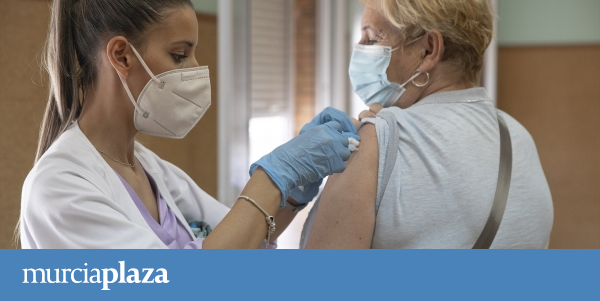MURCIA. Since its inception in March 2020, various causal strains have appeared:Alpha, Beta, Range, Delta– until 26 November 2021, when a new variant called omicroninvading in a short time almost all over the world thanks to its great diffusion capacity, 4-5 times greater than the previous strains.
Among its differential characteristics are the lower severity, the low rate of hospital admissions, the lower need for oxygen therapy, together with the reduction of complications and low mortality. Mortality in these cases is associated with age > 80 years and high comorbidity; that is, people who have several diseases at the same time. In a study in Italy it was also found that the absence of treatment with angiotensin inhibitors at the time of hospitalization is associated, in patients with greater comorbidity, with an increase in mortality. Similarly, in a meta-analysis of 52,122 patients, which includes various strains from eight studies, analyze the influence of statin use on the evolution of covid-19, finding that statin use did not start before but upon admission to hospitalization, it was associated with a reduced risk of mortality.
“During 2022, several variants emerged, motivated by their great ability to carry out mutations on the S protein chain of the virus”
During the current year (2022) several variants have emerged, motivated by their great ability to carry out mutations on the S protein chain of the virus (SAR-CoV2). Thus, they have been described BA1 yes BA2 then BA4 yes BA5. The latter are more frequent in Spain. The substitutions in the S protein chain of the virus particularly affect the BA2, in its greater ability to limit the effectiveness of basic vaccines in their protection against covid. The BA4 yes BA5, have a greater fusogenic capacity, reaching the lung cells better than the previous ones, being more pathogenic and widespread. The severity in all of them is very similar, and their mortality is significantly lower than in the delta voltage. In a study in South Africa of 37,573 patients with Delta infections, their mortality was 25.9%, while in 6,074 with Omicron BA1 or BA2 yes 837 with BA4 yes BA5 their mortality was 10.9% and 7.1%, respectively. In patients who had received three doses of anti-covid RNA vaccine (Pfizer or Moderna), their mortality is reduced in >95% of cases.
In his symptomatology, a greater participation of the respiratory tract stands out. In 1,139 cases of covid from Omicron variants in Shanghai, the three most frequent manifestations were: cough (57.5%), expectoration (48.3%) a congestion nasal yes runny nose in 43.4% of cases. Nasal congestion and rhinorrhea were greater in people with a three-dose vaccination (44.3%) than in those not vaccinated (23.1%). Variations in fever, whole body fatigue, and loss of appetite between vaccinated and unvaccinated populations are also described. In mild infections omicron, the symptoms are less than in previous strains. In relation to the alterations of smell and taste, according to the series, between 10% and 39% are observed, but always to a lesser extent than in previous infections.
The clinical duration
Another of its differentiating points is its clinical and microbiological duration. Therefore, the duration of its viremia is usually more than seven days, noting that the culture and the antigen test continue to be positive after 7 days in 20% and 23% of cases respectively, favoring it especially in cases of hyperglycemia. Also in a press study at the prestigious CMI magazine viraemia was > 10 days in 13.5% of cases and 11% were asymptomatic. In these cases, performing covid PCR with a viral load <35,000 copies has a predictive factor of absence of viraemia close to 100% of cases. For all of the above, its proper control is crucial, as it significantly affects its insulation.
“The important thing continues to reside in the vaccines adapted to the new variants, without underestimating the great value of the classic rules: hand washing and masks”
In relation to its prevention, the commented fact is known that the protection of vaccines for Omicron strains is limited. In the Spanish national study which included more than three million vaccinated people, published in September in Hand, the efficacy of vaccination with three doses of vaccine was 51.3% overall. In Canada, out of 16,877 cases of Omicron, two doses of the vaccine achieved 36% protection up to 59 days and only 1% after 120 days. With three doses his protection rose to 61%, avoiding the high severity and poor evolution in 95% of cases. In people over 80 years of age, the protection of three doses of vaccine, in order not to develop covid, is equal to 75.5% and of over high severity and mortality of 96.4% and 95% respectively. In immunocompromised patients, it occurs similarly the achievement of a protection of 67% when the voltage enters BA1but if it is BA2 yes BA4/BA5drops to 32%.
All of this highlights the need for revaccination with the modern RNA vaccines adapted to these new variants.
Variation problems
The problems of these variants can be classified into three large groups: a) Clinical b.-Diagnostic c.- Therapeutic.
Symptoms are confusing and may begin with loss of appetite, persistent headache, rapid heartbeat, or chest pain and go unnoticed. In his diagnosis, the antigen tests in this new era of omicron they have a sensitivity ranging from 78.8 to 86.7% with an average of 83%, which may be related to their low viral load. Finally, in his treatment various antivirals and anti-covid monoclonal antibodies begin to develop resistance, especially in BA4 / BA5during the treatment.
Therefore, although new variants continue to appear in other countries such as BQ1.1, etc., the important thing continues to lie in its prevention through the administration of vaccines adapted to the new variants, without underestimating the great value that the classic standards maintain, of highly effective to avoid contagion: use of the FP2 mask and frequent hand washing with water or soap or with hydroalcoholic derivatives, especially when going indoors or in spaces with many people, gatherings, large gatherings, etc. .
Joaquin Gomez Gomez
Emeritus Professor of Infectious Medicine at the University of Murcia


